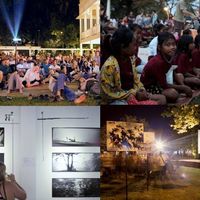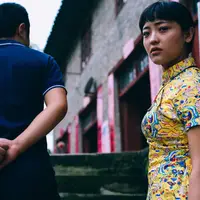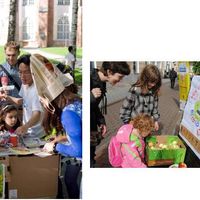Visual Perspective Series | In the Homeland

http://vimeo.com/28966536
culture360.org and Angkor Photo Festival present the first of a series of bi-monthly photo stories by one Asian and one European photographer who are exploring similar themes or issues in their work.
In this first series, we present In the Heartland by Ying Ang and MIVERINA, back to Madagascar by Rijasolo. Although one takes place in China and the other off the coast of the African continent, both stories were produced when the photographers journeyed back to their ‘homeland’ - the place of their ancestral origins.
These two bodies of work were selected to be shown at the 2010 Angkor Photo Festival.
Some believe it is the natural inclinations of human beings to want to understand where they came from. Retracing one's roots to see what our alternate existence would be like if we had never left. Or perhaps, it is a way to use the past to better understand the present.
This instinct is certainly true for Rijasolo, who undertook a journey back to his ancestral homeland of Madagascar to rediscover what he had forgotten, and to reconcile his imaginings of a country with the real, living nation.
Born in France, Rijasolo documented his return to Madagascar after 20 years of absence in an evocative series of photographs that reveal his 'outsider' status as much as his desire to understand his homeland.
He explains in his statement that although he "felt a desire to reinvent an identity after all the years of diasporic existence", his work also showed "violence in [his] incapacity to be totally assimilated to this Ancestral Land, and violence in the idea of being a resolute foreigner in [his] native country."
And as he goes on his journey, so do we, as the viewer. From glimpses of happenings on the streets, to passing sights seen as if from the corner of one's eye, we feel his effort in trying to see more, know more, and thus, understand more.
In his images, we pass a spectrum of people - a farmer in his field, barebodied laborers, a girl passed out on a floor of a bar. As his journey continues, and we move from detached street scenes, with people passing by or waiting idly by the side of the roads, to warm portraits of people he is spending time with. In a way, as he moves from being outside to indoors, the change of location also reflects the progress he makes in forming a connection with the country.
For Ying, her own experience contrasts with Rijasolo’s, in the sense that she did not feel like a “foreigner” upon her trip back to Hainan Island, where seven generations of her relatives have made their lives and continue to do so.
Immersing herself within the community, she looks at the tension inherent in the rural heartland arising from a rapidly modernizing China. From her artist statement:
"A skewed demographic of mostly young children and elderly people in the villages make the lack of dynamic youth stark in contrast to the ever-growing floating population of unemployed 20 somethings descending on city centres. Reminiscent of communities who have lost their young men to war, this toothless and infant-dominated population is left to fend for itself amidst a swathe of cross-provincial issues such as climate change, water pollution and the rising cost of farmland."
Rather than approach the topic as a broad documentation of a social issue, Ying's story focuses on the village where her mother's family is from. The people she photographs are mostly related to her in some way, or long-time family friends. This intimate setting, due to close relationships and blood ties, contrasts with Rijasolo's exploration of the street and city as a stranger.
In an email interview, she elaborates: "The intimacy was very quickly felt in my village. I never had a problem connecting with the very young or older members of the community, although the young adults who were closer to my age were much harder to relate to."
Her intimacy with the people and place is evident in her work, which pulls apart a curtain to reveal a rather melancholic side of life in China’s rural countryside. With sombre shadow and dark corners, we are shown a place that has been left behind as the rest of the world marches ahead.
Ying describes a sense of “being lost and out of touch”, and explains “there is a strong feeling of disappearance of a way of life, of traditional values, of beliefs that were not so long ago more certain than mortality. It is the end of this that brings the inevitable nostalgia and melancholia to the way I perceive the village and the work.”
The Photographers
YING ANG is based between Melbourne, Singapore and New York, A photographer of social anthropology and contemporary developments, her interests lie in creating visual content for print, web and installation, exploring a range of formats, styles and creative collaborations. Ying has exhibited internationally in group and solo shows, in addition to working for clients such as The Wall Street Journal on editorial features. She recently graduated as valedictorian for the 2009-2010 class of Documentary Photography and Photojournalism at The International Centre of Photography. Ying was awarded the Women in Photojournalism Award by the NPPA in 2009 and exhibited her personal work at FotoGrafia Festival di Roma 2010.
(Website: http://www.yingangphoto.com/)
RIJASOLO was born in France in 1973 and began photographing in 2001. In 2004 he started a personal project titled "MIVERINA" which he shows his intimate relationship with his country of origin, Madagascar. In 2006, he trains in photojournalism at Ecole des Métiers de l'Information (EMI-CFD) at Paris, and becomes a freelance photographer. In 2007 he co-creates the collective Riva Press with four photojournalists based in Paris. He regularly works with newspapers and magazins in France. His story Miverina has recently been published by Burn Magazine. Rijasolo lives and works between France and Madagascar.
(Website: www.rijasolo.com)
Jessica Lim is the Asia Coordinator of the Angkor Photo Festival.
Created in 2005, the annual Angkor Photo Festival is the first such event to be held in Southeast Asia. A member of the Asia Pacific PhotoForum The weeklong festival showcases work by photographers all over the world, and acts as a platform for discovering new talent and encourages the exchange of ideas across continents.
Similar content
posted on
01 Dec 2011
posted on
16 Aug 2012
from - to
30 Oct 2018 - 30 Oct 2018
05 Dec 2012





